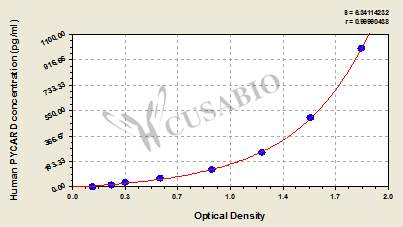PYCARD, also known as apoptosis-associated speck-like protein containing a CARD, is an adaptor protein that plays a central role in innate immune signaling and inflammasome assembly. This protein contains both a pyrin domain (PYD) and a caspase activation and recruitment domain (CARD), allowing it to bridge interactions between pattern recognition receptors and downstream effector proteins. PYCARD is essential for the formation of inflammasomes, multi-protein complexes that activate inflammatory caspases and process and secrete pro-inflammatory cytokines such as IL-1β and IL-18, making it a key mediator in inflammatory responses and cell death pathways.
This Human PYCARD ELISA kit (CSB-EL019114HU) uses a quantitative sandwich measurement principle to detect PYD and CARD domain containing protein in human samples. The assay works with serum, plasma, and tissue homogenates with a detection range of 15.6 pg/mL to 1000 pg/mL and shows a sensitivity of 3.9 pg/mL. The protocol requires 50-100 μL sample volume and can be completed within 1-5 hours, with detection performed at 450 nm wavelength.
Application Examples
Note: The following application examples are drawn from a selection of publications citing this product. For additional applications, please refer to the full list of references in the "Citations" section.
This ELISA kit has been used in respiratory disease research to quantify ASC protein levels in lung tissue homogenates. The kit supports studies of inflammasome pathway components and their role in inflammatory responses.
• Respiratory disease research: Measuring ASC protein expression in lung tissue to understand inflammasome activation patterns
• Inflammasome pathway studies: Quantifying ASC alongside other inflammasome components including NLRP3 and caspase-1 to evaluate inflammatory signaling cascades
• Cytokine network analysis: Integration with inflammatory mediator profiling to examine relationships between inflammasome components and pro-inflammatory cytokine production
• Tissue-based protein analysis: Application in homogenized tissue samples to measure target protein levels in disease-relevant biological specimens






